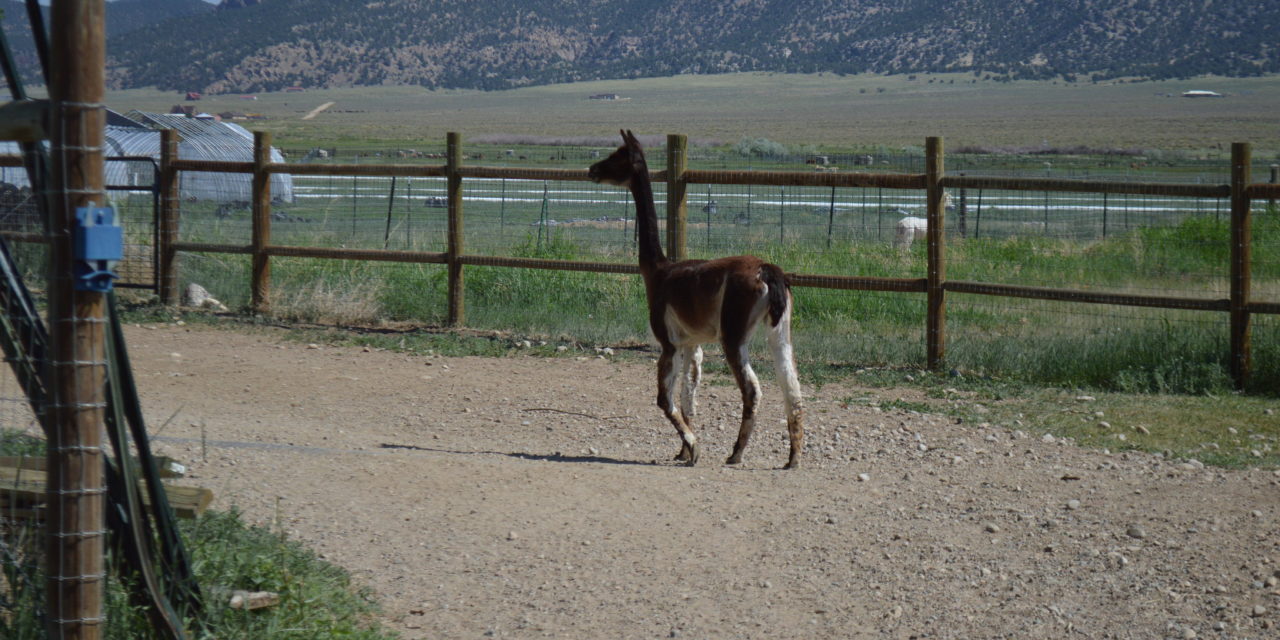The past week has been hot and dry; the kind of weather that wears on animals as well as people. During the week of June 14, Jefferson Farms Natural Fibers LLC began giving their herd of Paco-Vicuñas their summer haircuts.
Paco-Vicuñas have a much thinner neck and thinner legs than alpacas. Jane Levene, owner of Jefferson Farms described Paco-Vicuñas’ temperament as along the lines of “Border collies” and alpacas as “golden retrievers.” During this week of shearing, the farm hopes to get through 365 of their animals. The luxury fiber is considered an ideal fiber for hand spinners.

Each crew member has a specific job to move the process along quickly and keep the animals as comfortable as possible. Image by Brooke Gilmore
This process is done with a team of 20 or so people and includes family, friends, fiber artists, and farm workers. The haircuts are a careful process.
“The safest thing is that they are immobilized because the clippers can slice them open or take off a person’s finger. We run a much bigger team of shearing than most people do just to make it easier for both animals and people.”
The animals are taken into the shearing barn in groups of five to six where they are held in a staging area. Six people are in the staging area so four can carry out the animal together and then secure them for shearing.

Paco-Vicuña receiving their summer haircuts. On the left, the fleece is laid flat so it does not stick together when stored. Image by Brooke Gilmore.
“The way we carry them out is really no trauma. It keeps the animal calmer. They can lay them down gently. Some people [in other operations] will just walk them out and they’re struggling or jumping around, or they’ll have just two people. We invest more money in the process so that it’s safer and calmer for the animals. It really is just like a little factory, and it works well.”
The animals are then strapped down on the foam floor to help keep everyone safe. They are vacuumed to clean off their fleece where they then receive routine medical care and some basic upkeep. Paco-Vicuñas are like beavers, in that their teeth continue to grow throughout their life, so during this time the animals will also have their teeth and toes trimmed.
Isaac Kenison, who lives in Utah was the shearer. He specializes in alpaca and llama shearing, teeth, and toe trimming in Utah, Idaho, Nevada, Colorado, Arizona, Wyoming.
Vicuñas are relatives of the llama and are now believed to be the wild ancestor of domesticated alpacas, which are raised for their coats. Vicuñas produce small amounts of extremely fine wool, which is very expensive because normally the animal can only be shorn every few years.
All the animals at this farm are microchipped and registered. After shearing, the crew pulls a sample of the fleece for analysis which is ultimately how the farm decides what animals to breed. The micron fiber is measured, and everything is data-driven in order to get the highest value fleece and healthiest possible animals. The next few weeks will be spent going through the fleeces, skirting them, sorting them together into lots.

Image by Brooke Gilmore.
The farm plans to set up a felting studio to host classes. They also will have a farm store. “Our whole thing now is to finish our projects, get to where we’re building classroom space, a community room and we made part of it ADA-compliant.” Levene recently purchased the former Scott property and hopes to breathe new life into it through community activities.
“The beauty of fiber arts is it can go anywhere. We’re on the very brink of greatness is how I feel about it,” said Levene.
Featured image: one of the Paco-Vicuña in her new summer haircut. Image by Brooke Gilmore.








Recent Comments